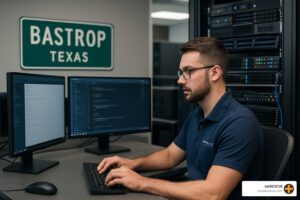

Cybersecurity Policies to Consider Implementing for Remote Employees Tips From Your Experts in Small Business Cybersecurity in San Marcos
Cybersecurity is the practice of maintaining control over computer systems and data integrity while minimizing the risk of unauthorized access or damage through malicious attacks. A cybersecurity policy defines a set of security practices used by employees, contractors, partners, users, and third parties interacting with your organization’s network(s). The goal of a well-written cyber policy should be simple. Ensure you are keeping up with current best practices so as not to put your business at risk due to outdated policies unintentionally. The following are cybersecurity policies to consider implementing for remote employees.
Access Control Policy
Your company may have an existing access control policy that includes guidelines on who can enter specific areas of your network where sensitive information or assets reside. In general, if you do not limit entry based on precise job functions and responsibilities, it will be difficult for management to ensure that only the desired people are accessing certain areas of your network when necessary for their job function. Your access control policy must also address how often individuals can change their passwords, which services they can use to connect to your networks, what types of devices they can use to connect to the Internet, and whether your staff can get online from home computers or mobile devices, and much more.
Administrator Rights Policy
This policy addresses administrators’ rights and privileges to manage a network. A good administrator rights policy outlines what administrators can and cannot do on the network, including installing software, configuring network settings, backing up files or databases, performing backups, etc. An example of a lousy admin rights policy would let anyone add new accounts or modify user accounts without first getting approval. A good policy might require all changes to be approved. Make sure you understand the implications of this policy before you roll out any updates or changes.
Audit Log Policy
If you allow employees to connect to your network via public WiFi hotspots like coffee shops, airports, or hotels, consider setting up a policy that requires them to log into each site beforehand. Otherwise, they may leave valuable files, such as credit card numbers, customer or vendor records, bank statements, or personally identifiable information, publicly available because they connected through a wireless connection. Some companies even go further than requiring people to log in to a VPN, requiring them to identify themselves using their valid work email address and password before accessing anything work related.
Data Loss Prevention Policy
DLP is a technology that monitors file transfers and automatically blocks certain types of content from being transferred between different locations within your network (for instance, blocking malware attachments). It’s important to note that this policy does not prevent employees from transferring sensitive data outside of the company but instead prevents the transfer of potentially illegal or harmful files inside the firewall. Any time someone needs to send sensitive data outside of the firewall, they should obtain explicit permission from IT.
Data Security Policy
All of your employee’s data belongs to them but ultimately it belongs to the company too, so ensure you give them adequate privacy options to protect that data. You can implement policies regarding when and how frequently they can access their Gmail account, calendar, contacts, voicemail, and other electronic communications tools; whether they can back up their data remotely; what operating systems and applications their device(s) can utilize; and more. Giving your employee secure tools to utilize to store and manage their data can be a great start to ensuring they are more secure when working from home.
Cybersecurity Services in San Marcos Texas
In conclusion, with the rise of remote work, it is crucial for companies to implement effective cybersecurity policies to protect their sensitive data from cyber threats. By implementing measures such as two-factor authentication, VPN usage, and regular training sessions, businesses can ensure the safety of their remote employees and their confidential information. If you’re looking for expert guidance on bolstering your remote workforce’s security and a professional in San Marcos Texas IT services, look no further than San Marcos digital security company, TekRESCUE. Contact us today to learn more about our comprehensive cybersecurity solutions and safeguard your business from potential cyber attacks.
Table of Contents



